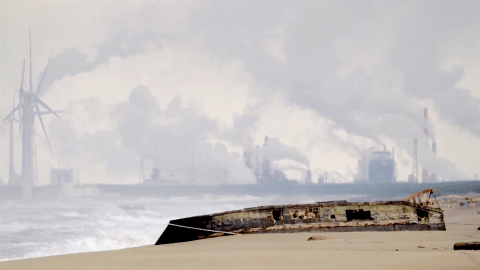Why North Korean ‘ghost ships’ are washing up on Japan’s shores

Japanese police discovered another “ghost ship” washed up on its shores in mid-January. On the heels of 104 such ships in 2017, this wooden ship carried the corpses of seven men as it came ashore in the Ishikawa prefecture.
The men were carried badges with the likenesses of the North Korean leaders Kim Jong-il and Kim Il-sung. The fleet of vessels as a whole is from North Korea, with people driven to undertake a very dangerous journey on turbulent seas.
North Korea is over 600 miles (1,000 km) away from Japan. It also doesn’t help that the boats being sailed are not well-prepared for such a long journey.
One explanation for the ships may be the terrible living conditions inside North Korea. Jeffrey Kingston from Temple University in Japan called the ghost ships “ “a barometer for the state of living conditions in North Korea — grim and desperate.”
Indeed, in July of 2017 the United Nations reported that North Korea suffered a severe drought that dramatically curtailed the country’s food production, resulting in shortages.
Other experts say the “ghost ships” may be a result of the pressure from the North Korean government on fishermen.

Two North Korean fishermen work on the Yalu river near the North Korean town of Sinuiju, opposite the Chinese border city of Dandong, in China’s northeast Liaoning province on September 4, 2017. (Photo credit: GREG BAKER/AFP/Getty Images)
Ma Chang-mu, a senior researcher at the Korea Maritime Institute in South Korea, explained why fishing is such a big deal for the rogue nation.
“Fish are a vital resource for North Koreans because they are the cheapest source of protein and they can sell it to China for cash,” explained Chang-mu to CNN.
And the stats bear this out – North Korean seafood exports to China jumped 88% in the first half of 2017, according to the Korea Institute for International Economic Policy.
Miyamoto, the Seigakuin University professor, maintained that the booming seafood trade is actually indicating that the North Korean economy is doing well, since seafood is a luxury item.
“They are fishermen [trying] to earn money,” Miyamoto explained. “Now North Korean economics, which adopted free-market partly, have grown and generated a wealthy class. A wealthy class demands not caloric food, but healthy food. So seafood, which are healthy, is popular in North Korea. It is evidence not that the North Korean economy is deteriorating, but that the North Korean economy is growing … Hungry people demand not seafood, which are low-calorie, but cereal and meat, which are high-calorie.”
Overfishing, which causes a depletion of local fish, might be another reason fishermen end up crashing far from their shores.
How many bodies have been recovered altogether is not revealed by Japanese authorities for diplomatic reasons but evidence suggests it’s a considerable number. Just in the period between November and December 2017, 15 ships with over 40 corpses washed up on Japan’s west coast, reported Business Insider.





